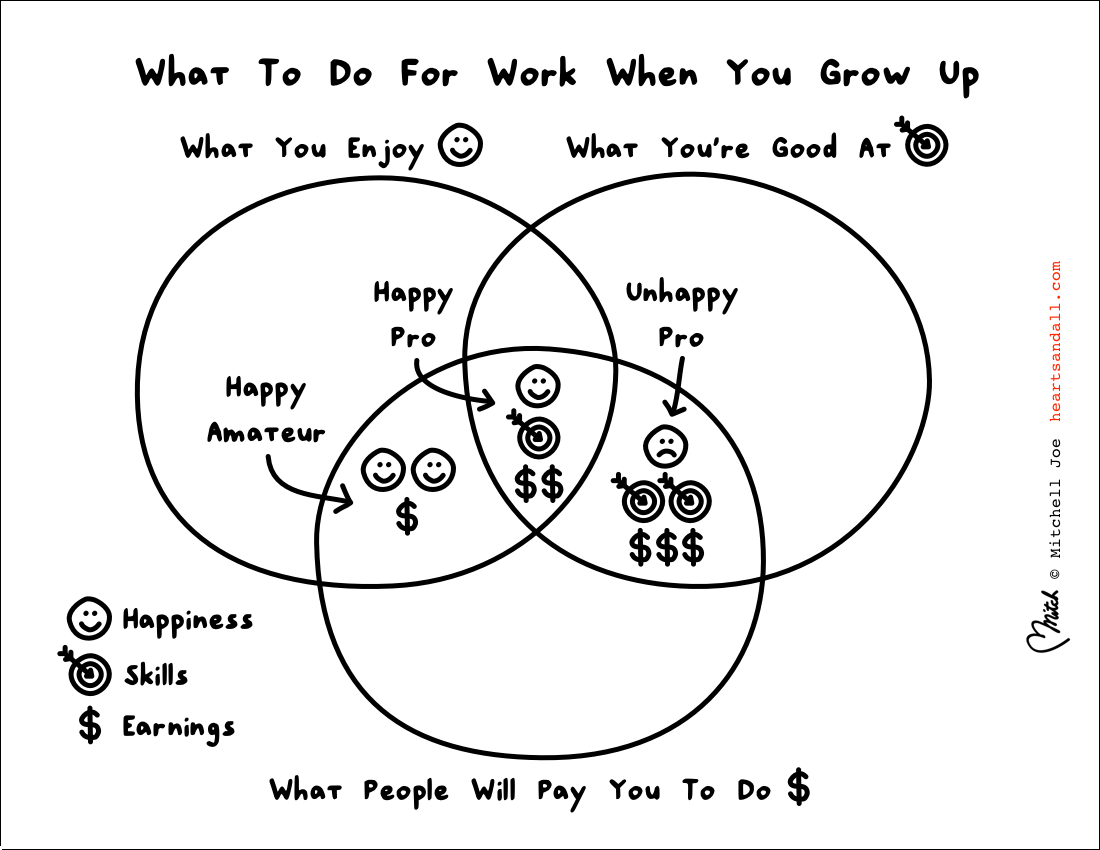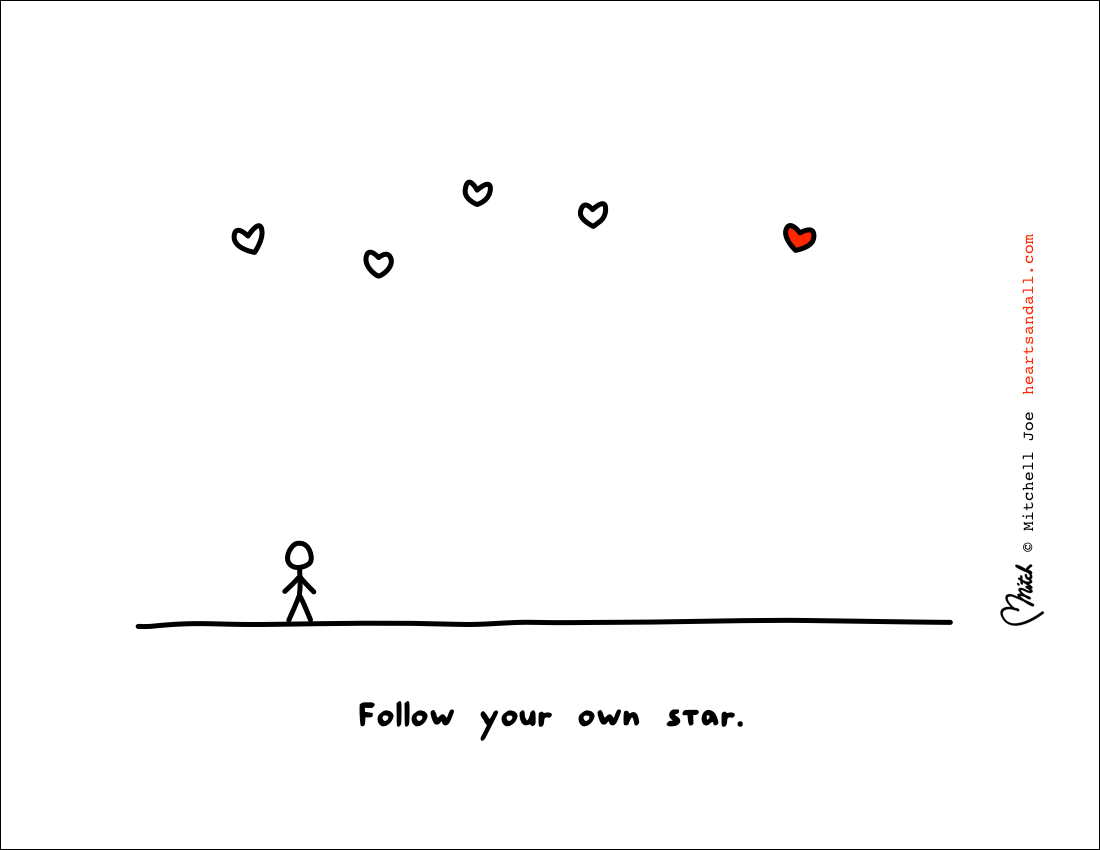Somewhere near the top of your list of Things To Do should be figuring out what you want to be when you grow up. If you’re like me, then it might take you quite a while. At least 25 years. This task can be daunting, so let’s think about an easier problem first. In many children’s books, there is a puzzle that shows several fisherman with tangled lines and only one line that leads to the one fish. The problem is to figure out which fisherman has caught the fish. The way that a lot of people go about solving this problem is to start with the first fisherman and follow his line and see if it leads to the fish and then repeat this process with the other fishermen’s lines to see which line leads to the fish. Edward de Bono has pointed out that there’s a better way to solve this problem, though, and that is to start at the fish and then follow the line up to see which fisherman that the fish’s line leads to.
That is how you should think about discovering your life’s work. Rather than going to the classifieds to see what types of jobs are advertised there, think about who you are and what excites you and how you might be able to turn that excitement into a service that someone else would be willing to pay for. Start with you, not the job. Start with the fish. Work on being you and then describe your ideal job, rather than the other way around. Don’t look at a job description and then try to fit yourself into it. Even if you do manage to squeeze yourself into that job description, it won’t be comfortable. It will be like trying to fit a square peg into a round hole. When you find yourself in a square peg round hole situation, you always have two choices—you can whittle down the edges of the square peg to make it fit in the round hole, or the can carve out some corners of the round hole to make the hole bigger and square. You’ll be happier if you can remain the shape of peg that you naturally are.
Howard Thurman put it this way: “Don’t ask what the world needs. Ask what makes you come alive, and go do it. Because what the world needs is people who have come alive.” Now some people might think that this sounds nice from the philosopher’s armchair but that it just won’t work in practice. You can’t just decide to do what you love and then hope to make a living at it. That won’t work, they say. But: How many people try? Most people just talk themselves out of their dreams first and then quickly assume that they were right to choose a different, supposedly more practical path.
I have some small proof that it is possible to do what’s on your heart and make some money at it. One day, I started drawing stick figure art, just because I wanted to. I bought a blank pad of paper and told myself that I would fill every page with a drawing within a week. There was some creative part of me that needed to be let out. Apparently, it needed to be let out so badly that it was willing to come out in stick figure form. Anyone can draw a stick figure, but not many people do. Then I decided to try to sell the drawings as greeting cards, framed prints, and mugs. What happened next was sort of amazing. Perfect strangers parted with perfectly good cash in order to have my drawings of stick figures hanging on their wall. People have used them to propose marriage. The drawings have made people cry. They have made people laugh. They have made me money. I haven’t made enough money from them to quit my day job yet but I have made enough money to buy quite a few burritos. And those burritos taste extra good. They taste so much better than the ones that I bought with money that I made in some other way. Making any money at all selling drawings of stick figures seemed like a life victory to me.
No one was ever going to tell me that I should draw stick figures and try to sell them. That sounds silly. But that is what I felt I was meant to do. You will have to figure out what is in your heart and what you were meant to do. It might be tricky but they call it a calling for a reason. It will call you. Don’t ignore the call.
There is, of course, the practical moneymaking side of work, but that’s definitely not all there is. When you’re thinking about what to do for work, think about these three things:
- what you enjoy doing
- what you’re good at
- what other people will pay you to do
Then look at how they overlap in your life and look at what you’re willing to give up. Because there will be tradeoffs. It will be very easy to choose to do the thing that you enjoy the most, are very good at, and pays the most when it is all one and the same thing. But you will undoubtedly find yourself in situations where it’s not one and the same thing, so you need to decide what’s important to you and how to navigate the tradeoffs. I hope the words and chart below will help you navigate the tradeoffs of some typical decisions that you may face.
Let’s start with money because you’ll need to make some money to support yourself. The thing to notice here is that you don’t need to make the most money that you possibly can, you just need to make enough to support yourself. You should save some money, too, for rainy days, and for the sunny ones. I’m not suggesting that you aim for the bare minimum you need to scrape by. What I’m saying is that if you have a chance to make $100,000 a year at a job that will make you miserable or $90,000 a year at a job that you love, and you need to make only $50,000 a year to live comfortably, then you should take the $90,000 a year job. After you have enough money to live comfortably, you should start counting your smiles instead of your dollars.
The people who pay you don’t care whether or not you enjoy what they are paying you to do. That doesn’t make them mean. They just want their house painted or their lawn mowed or whatever. There’s nothing wrong with that. It’s not their job to make sure that you’re happy. That’s your job.
You will be paid more for things that you’re skilled at doing but here again be careful not to fall into the trap of doing something because you’re good at it rather than because you enjoy it. It can be easy to confuse the two because it can feel good to be skilled at something. But the fact that you are praised or win awards for something is not a reason to continue doing it. The only thing that really matters after you have enough money to live comfortably is whether or not you’re enjoying yourself. As G.K. Chesterton said, “If a thing is worth doing, it is worth doing badly.” On countless waves, I have been an inelegant surfer. But it doesn’t matter. Because surfing is so much fun to me that when I’m on a wave, I don’t care who’s looking or who laughs. I’m having the time of my life. Basketball great Michael Jordan won 3 NBA championships and then decided to retire prematurely and pursue a career playing professional baseball. He didn’t need any money, and he was much better at playing basketball than he was at playing baseball, but he wanted a career as a baseball player because he thought it would be more fun. That was the right decision for him to make.
Here is a diagram that shows some typical job options and the decisions you would have to make about the tradeoffs of the different jobs. If the job that pays you the most is also the one that you enjoy the most, then you won’t have to look at this diagram. But whenever that’s not the case, you might find it helpful to consult this diagram.

The great thing about doing what you enjoy is that it’s very likely that you will get better at it and then people will pay you more. They’ll pay you more because you’re good at it, not because you’re enjoying yourself. You’ll get better at doing what you enjoy because you’ll be paying more attention to what you’re doing and you’ll be more willing to put in the extra hours that it takes to become better. If you’re lucky, it might even be one of your inner talents that is guiding your enjoyment. If you choose work as a Happy Amateur, you will then be naturally pulled towards finding work as a Happy Pro as your skills naturally increase. You may want to take work as a Happy Amateur instead of a Happy Pro or an Unhappy Pro if the work makes you much happier and you don’t need the increase in salary that comes with being a Happy Pro or an Unhappy Pro. You should definitely consider taking work as a Happy Pro instead of working as an Unhappy Pro because you’ll be happy instead of unhappy. If you take work as an Unhappy Pro, then you will know exactly how much your smiles cost because you will be trading them away for money. If being an Unhappy Pro brings you more money and you need the money to pay the bills, then you’ll have to do your best to grin and bear it, but if you don’t need the money to pay the bills, then resist that high paying job as an Unhappy Pro. If you stay in realm of what you enjoy, your skills at the Happy Pro job have a good chance of catching up with your skills at the Unhappy Pro job for the reasons I just mentioned about doing what you enjoy doing.
Find the thing that you would happily do for free on a Saturday and then get to work figuring out how someone might pay you to do that. As the saying goes, “Find something you love to do and you’ll never have to work a day in your life.” The important part of this equation is that it starts with you doing something you love for free on a Saturday. You have to find thing that first. So start exploring.
If you listen closely enough during your explorations, you will probably always hear what’s in your heart and know what you want. Acting on that—doing what’s on your heart, is not always easy. It’s hard. Here are some quotes and a drawing to help you act on what you know and to help you on your way to figuring out what you want to be when you grow up. Good luck.
“Follow your inner moonlight; don’t hide the madness.”
—Allen Ginsberg
“To be nobody but yourself in a world which is doing its best day and night to make you like everybody else means to fight the hardest battle which any human being can fight and never stop fighting.”
—E.E. Cummings
“Be yourself; everyone else is already taken.”
—Oscar Wilde

You might also like:
- Decide what is important to you and spend your time accordingly.
- Be optimistic.
- Always ask yourself, “What is the worst thing that can happen?”
Next free chapter is coming soon. Sign up below to receive it by email.
Like it? Share it. Thanks!